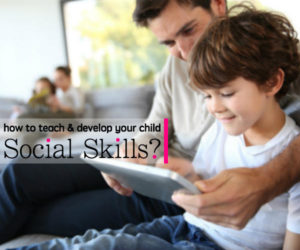
How To Teach & Develop Your Child Social Skills?
Here’re 10 Tips How To Teach & Develop Your Child Social Skills:
Most people realize that being successful in life personally and professionally requires social skills. Think about the successful people you know, they are generally self-aware, know how to manage themselves effectively and know how to understand and work effectively with others. Social skills are required to succeed in friendships, school life, community life and eventually working life.
According to the study “University of Illinois in Chicago”, has shown that children score 10 percent to 15 percent higher in achievement tests when they have been taught social-emotional skills.
The question is:
how are our children going to learn these skills when they have fewer opportunities than their parents had to learn social and emotional intelligence through playing and communicating with their peers in a spontaneous and unstructured way?
Due to the climate of fear and increasing safety precautions:
children have little time to play unsupervised with other children, to roam, explore and learn from experiences. They don’t have the degree of freedom children of previous generations had to play in groups, take roles as leaders or followers, speak their mind, learn how to communicate and influence others and understand their own strengths and weaknesses through daily experiences with their peers.
Related Topics:
So how do we as parents address this trend of declining social skills? How can we teach our children the social skills they need to prepare them for life?
Here are 10 tips to How To Teach Your Child Social Skills:
1. you need to find time to be social and communicate with your children:
Family dinner together is a perfect opportunity:
- Sitting around the table over a meal gives family members a chance to share their experiences of the day, laugh and joke or support and comfort each other.
- These daily interactions help children develop skills in listening, taking turns and expressing themselves.

- I encourage you to ensure the television is turned off during dinner and that children learn to sit at the table until everyone has finished eating or speaking.
- Dinner together is also an ideal opportunity to teach your child manners such as proper use of cutlery or asking to get down from the table.
2. Children learn by what they see you do, not what you say they should do:
Be a model of good social skills for your child:
Use every chance you can to show how you try hard to understand others,
For example:
You could do that by demonstrating how you think about another persons feelings, how you try to “step into their shoes” to better understand how the world looks from their perspective, how you think carefully about how you say something to someone and try to anticipate how they will “hear” it first, before you say it.
3. Explain to your Child:
- Explain to your child, as you demonstrate these skills, how and why you are doing it.
- Ask them how they could do it better.
4. When your child mentions a disagreement with another child, take the time to discuss it together:
- Take the “side” of the other child and help your child see the different perspectives and the possible reasons why the other child acted as they did.
- Encourage your child to tell you what they would like to say to the other child, discuss with them how you would feel if you heard that.
- When your child is ready, encourage them to go back and discuss the matter with the other child and try to resolve it themselves.

5. Talking to your child and explaining the choices you have made in life provide rich opportunities to teach social and emotional intelligence.
- When you are faced with a difficult decision or a painful experience, don’t hide it or try to “protect” your child.
- Be open and talk to your child in a language they can understand.
- Communicate about your thoughts and emotions and ask them about their thoughts and emotions.
- Explore with them how they might have handled the situation or the choices they might have made.
- Being able to speak in a “language” of emotions is a vital part of emotional intelligence.
6. notice their feelings & comment to your child about them:
When your child displays their emotions by being either upset or happy, notice their feelings and comment to your child about them.
- Be a model to your child of someone who reads the emotions of others and responds sensitively.
- If they are hurt, ask them kind and sensitive questions to explore the hurt and explore what might be the best way to “make it better”.
- If they are happy, explore and savor the happiness, ask questions about what made it so good, so both you and your child will learn how to experience that happiness again in the future.
Related Topics:
7. Traditional board games are an excellent way to teach children social skills:
Buy or dust off games like draughts, dominoes, connect four and card games, which are not only terrific fun but they are also stimulating, encourage concentration and involve communication and social interaction skills.

8. Explain the rules of game:
Explain that to enjoy playing games we all have to play by the rules, respect our partners and respect the outcome of the game. Regardless if we win or lose, to have fun playing games together we can’t gloat when we win, and can’t get upset when we lose. If we play lots of games together, there will be lots of chances for each of us to win sometimes, and lose sometimes.
9. Summarize What Did You Learn Form that game:
Whether your child wins or loses, at the end of the game summarize what you learnt from the game and then ask your child:
- “what did you learn from that game?”
- “What might you do differently next time we play?”
10. Praise your child highly when they get it right:
Whether that be understanding the needs of a friend, communicating their own feelings in calm way that allows you to:

- Discuss it together or managing their time so they get their homework done before they go out to play,.
- Let them know what they have done well and that you are proud of them.
- Children learn much more effectively from praise and recognition, in contrast to punishment and reproach.
Not only will you being giving your child skills that will help them succeed in life, I also imagine that the time you spend with your child will be of a much higher quality and you will find that you are growing much closer together as well as enjoying and appreciating each other more than ever before.
If you find this article useful, don’t forget to share it with your friends and family, as you might help someone in need. Thanks.
Disclaimer: “Nothing in this article makes any claim to offer cures or treatment of any disease or illness. If you are sick please consult with your doctor.” sciatica pain sciatica pain sciatica pain sciatica pain
if you want to read more articles about How To Learn & Develop Your Child Social Skills, and more About Parents and family topics, Please
Click Here!
Excellent nutrition is the basis of a healthy Life!
Liked the article? Share the love!








